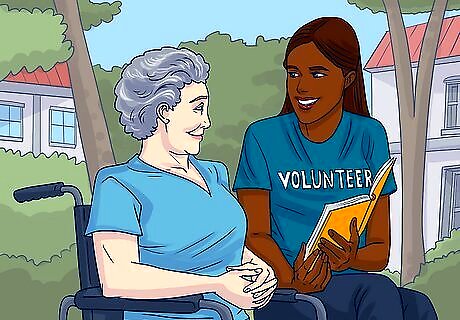
views
X
Research source
Jesse, D.E., Kim, H., & Herndon, C. (2014). Social support and self-esteem as mediators between stress and antepartum depressive symptoms in rural pregnant women. Research in Nursing and Health, 37(3), 241-252. doi: 10.1002/nur.21600
In contrast, having low self-confidence can have a negative effect on our mental health, relationships, and school or career life. Fortunately, there are a number of ways you can regain confidence in yourself in general and in specific situations, such when you're in a relationship or at work.
Building Confidence in Yourself

Take stock of yourself. If you chronically lack confidence, it's probably very easy for you to catalogue your faults and failures, but what about acknowledging your positives? For most people, this is a lot more challenging. Researchers have found that self-esteem is comprised of both cognitive factors, such as positive memories you have of yourself and your behavior, and self-evaluation, or how positively you evaluate your current attitudes and behaviors. Make a list of everything you like about yourself - your qualities and skills that make you you. It can help to actually sit down and write out a list as things come to you. Grab a notebook or journal and set a timer for 20-30 minutes. Journaling is a good way to continually maintain and open conversation with yourself about who you are and want to be. It's a way to prompt self-reflection and self-discovery and may help you realize things about yourself that you didn't really know. Think also about some areas you'd like to improve, such as assertiveness or self-confidence. Contemplate not only what you feel, but why you feel the way you do. Begin to understand your true self, and allow it to exist. If you're not as good at handling some things as you are at others—for example, maybe you feel confident and capable until other people are thrown into a situation, such as in a relationship or at work—acknowledging all facets of yourself is the first step to transformation.

Look back on your life and your accomplishments. Chances are that you are not giving yourself enough credit for everything that you've done throughout your life. Take some time to reflect and look back at your past glories from big to small—things that you've done that you feel proud of. This will help validate your place in the world and the value you bring to the people and society around you and, in this way, build your self-confidence. Research shows that part of building self-esteem is having a solid schema of positive memories about your past accomplishments and abilities. If you begin to accept that you have been a bright, hopeful, confident person in the past, it becomes easier to believe that you can be amazing and do amazing things again. During this time, write a list of all of your accomplishments. Keep in mind that everything should be included, from big accomplishments to the little everyday things. Your list can include things like learning how to drive, going to college, moving into your own apartment, making a great friend, cooking a fancy meal, getting a degree or diploma, getting your first "adult" job, and so on. The possibilities are endless! Return to the list periodically to add to it. You'll see that you have lots to be proud of. Scan through old photos, scrap books, yearbooks, trip mementos, or even consider making a collage of your life and accomplishments to date. While this method works for some people, others struggle to take it seriously or find it embarrassing. If this sounds like you, try a different strategy like practicing self-care or spending time with people who value you. Reader Poll: We asked 146 wikiHow readers, and only 10% prefer to reaffirm their self-worth by reflecting on their accomplishments. [Take Poll]

Focus on positive thoughts and beliefs. Rather than get bogged down with negative thoughts, try to focus on positive, encouraging, and constructive thoughts. Remember that you are a special, one-of-a-kind person who is worthy of love and respect - from others and from yourself. Try these strategies: Use hopeful statements. Be optimistic and avoid the self-fulfilling prophecy of pessimism. If you expect bad things, they often occur. For example, if you anticipate a presentation going poorly, it just might. Instead, be positive. Tell yourself, "Even though it's going to be a challenge, I can handle this presentation." Focus on "can" and avoid "should" statements. "Should" statements imply that there is something you ought to be doing (that you're not currently doing) and this might cause you to feel pressured if you can't meet these expectations. Instead, focus on what you CAN do. Be your own cheerleader. Give yourself positive encouragement and credit for the positive things you do. For example, you might note that although you're not getting all the exercise you'd like to be getting, you have been doing to the gym one extra day a week. Give yourself credit for making positive changes. For example, "My presentation might not have been perfect, but my colleagues asked questions and remained engaged — which means that I accomplished my goal." Over time, this will help you reframe your thinking to be more confident.

Set goals and expectations. Write of lists of things you want to accomplish and set out to achieve these goals. For example, you might decide to volunteer more, take up a new hobby, or spend time with friends. Make sure your goals and expectations are realistic. Striving for the impossible will only deflate, not enhance, self-confidence. For example, don't suddenly decide that at age 35, your dream is to play professional hockey or be a principal ballet dancer. This is unrealistic and your self-confidence will likely take a hit once you realize how far away and unattainable that goal is. Instead, set more realistic goals, like deciding to do better in math class, learn how to play the guitar or master a new sport. Setting goals that you can consciously and consistently work towards and eventually meet can help you stop the cycle of negative thinking that reduces your self confidence. You'll see that you can set and meet goals successfully and will attain a sense of fulfillment. You could also set goals that help you see and feel your own competencies. For example, if you feel like you want to be better informed about the world, decide that you are going to read a newspaper every day for a month. Or, say you want to empower yourself in knowing how to fix your own bike and opt to learn how to do your own tune-up. Meeting goals that address things that help you feel powerful and capable will help you feel better about yourself as a whole.

Fake it 'til you make it. That old saying actually has some real value to it. Confidence doesn't happen overnight, but now that you have a good sense of who you are and what you want, you can put up a good front that will eventually translate into confidence within as well. The very act of trying to appear confident can actually increase your confidence, as you begin to see how it affects those around you. Use your body language to project confidence. Stand and sit with a straight back. Walk with easy, full strides. Make plenty of eye contact when you meet people, and if you're nervous, smile instead of looking away. Smile more. Studies have shown that the very act of smiling can improve your mood and make you feel more positive. Speak more (rather than less) and with greater confidence. This is especially true for women, who tend to speak less and with reduced assertiveness in social situations with men. Make a concerted effort to have your voice heard in social situations; your opinion matters and you have value to add to a conversation. When you do speak, speak clearly and with precise enunciation; don't mumble or cover your mouth with your hands or fingers.

Take chances. Remember that you can't control what anyone else thinks, feels, or does; you can only control yourself. Instead of being fearful of all of this uncertainty and your lack of control, try to embrace it. Accept that the world around you is a big and uncertain place by taking a chance on something new. You'll be surprised by how often you succeed when you're proactive – as the old maxim goes, “fortune favours the bold” – and if you fail, you'll be able to see that your life continues on anyway. Whichever way you cut it, taking a few risks and trying new things is one of the best ways to rebuild your lost confidence. Strike up a conversation with someone on the bus, submit a photo or story for publication, or even ask out your secret crush. Choose something that puts you a bit outside of your comfort zone and jump in headfirst with the knowledge that your life will go on no matter the outcome. Experiment with new activities; you might learn about talents or skills you didn't know you possessed. Maybe you take up running and discover that you are really good at distance running, something you'd never thought of before. This can help increase your self-confidence. Consider taking up artistic activities such as painting, music, poetry, and dance. Artistic endeavors often help people learn how to express themselves and attain a sense of 'mastery' of a subject or skill. Lots of community centers offer free or reasonably-priced classes.

Help someone. Research has shown that people who volunteer tend to feel happier and have higher self-esteem. It may seem paradoxical that to feel better about yourself you should help someone else, but science does prove indeed that feelings of social connectedness that accompany volunteering or helping others make us feel more positive about ourselves. There are endless opportunities to help others in the world. Volunteer at a retirement home or a homeless shelter. Get involved with your church or a ministry or a community that helps sick or poor people. Donate your time and service to a humanitarian or animal cause. Be a Big Brother or Big Sister. Clean up a local park on a community-organized occasion.

Take care of yourself. Putting time into yourself can also help improve your self-confidence in general. The healthier you are in mind and body, the better the possibility that you will be satisfied with your self. This means doing your best to be healthy, whatever that may look like for you individually. Some pointers include: Eat at least three meals a day that are based on healthy and nutrient-rich foods, such as whole grains, lean protein (like poultry and fish), and fresh vegetables to keep yourself energized and nourished. Drink water to hydrate your body. Avoid processed, sugary, and caffeinated foods and/or drinks. These can affect your mood and should be avoided if you're concerned about mood swings or negative emotions. Exercise. Research has shown that exercise can give a real boost to self-esteem. This is because exercise causes the body to release the "happy chemicals" called endorphins. This feeling of euphoria can be accompanied by increased positivity and energy. Try to get up to at least 30 minutes of vigorous exercise at least three times a week. At the very least, set aside time for a brisk walk every day. Reduce stress. Make a plan to reduce the stress of your everyday life by designating time for relaxation and activities that you enjoy. Meditate, take a yoga class, garden, or do whatever activity makes you feel calm and positive. Note that being stressed can sometimes make it easier for people to overreact or let negative feelings dominate.

Let go of the idea of perfection. Perfection is an artificial notion created and proliferated by society and the media and it does a great disservice to most of us by suggesting that perfection IS attainable and the problem is simply that we're not up to snuff. Nobody is perfect. Make that your new mantra. You're never going to have the perfect life, the perfect body, the perfect family, the perfect job, and so on. Neither will anyone else. Focus on effort rather than the desire for perfection. If you don't try something because you're afraid you won't do it perfectly, then you don't stand a chance in the first place. If you never try out for the basketball team because of your lack of confidence, it's a guarantee that you won't make the team. Don't let the pressure to be perfect hold you back. Accept that you are a human being and that human beings are fundamentally imperfect and make mistakes. In fact, our imperfections are what make us human and enable us to grow and improve. Maybe you didn't get into your top college or were rejected from a job. Instead of berating yourself for your errors, view them as opportunities to learn and grow and as things that you can rectify in the future. Maybe you'll realize that you need to think more about your future educational path or that you need to learn how build job interview skills. Forgive yourself and move forward; this isn't easy but it's key to avoiding that cycle of self-pity and low self-confidence.

Be persistent. Building confidence takes time, because each rush of confidence you achieve is temporary at first. You've got to keep at projecting confidence and taking chances in order to build up a real sense of self-confidence. Remember that self-confidence isn't a thing you achieve, it's a process. Throughout your life, you will constantly be working to build and rebuild your self-confidence as life throws its surprises and obstacles your way. You are constantly evolving, and so will your confidence.
Regaining Confidence in Relationships

Take care of yourself. The only way you can have confidence in relationships is if you have in yourself first and foremost. Follow the steps in Part 1 and try to build your own self-confidence. If you believe in your own self-value, that's part of the journey to building more confidence in your relationships. In addition, try spending constructive time alone with yourself and finding satisfaction and fulfillment in that; read a book, go for a walk, or do some exercise. You'll tap more into yourself and what you want and can then bring this into your relationships with others. Remember that developing healthy self-esteem is an important part of having a successful romantic relationship. In a study of 287 young adults, researchers found that those with higher self-esteem, which includes confidence in one’s appearance and personality, were more likely to have successful romantic relationships. If your confidence has recently taken a hit due to a bad relationship or breakup, take time to recover. Many studies have been reported that divorce and separation can have an adverse effect on your mental and physical health, including heightened stress and anxiety as well as the increased likelihood of developing alcohol abuse problems, diabetes, and heart conditions. It's not easy when relationships end, but you can recover from an ended relationship by taking time to emotionally work through it and move forward.

Reflect on your past. We can't change the past; however, we can change how we view the past, both its good and bad components. Try to think about your past relationships and how these might affect your present outlook. This will help you learn to cope with your romantic past without letting it define you. For example, maybe you had an ex who cheated on you in the past. Rather than blame yourself or carry the burden of the relationship on your shoulders for forever, instead think about how this experience has reduced your ability to trust potential partners easily and how you're always waiting for the other shoe to drop. Simply knowing about the relationship areas in which you lack confidence will help you overcome them.

Maintain perspective. Once you've "mourned" a prior relationship and have taken time to regroup and recover, you'll be better able to show some perspective and see that one end is another beginning. Think about that whole wide world of people out there; this is an opportunity, rather than something to be afraid of. There really are plenty of fish in the sea. You'll also realize that your romantic past isn't a reflection of who you are, but of bigger situations involving other people and factors (such as third-parties, long-distance, incompatibility, etc.). Relationships are not who you are, but something you engage in. When things don't work out, though you may feel to blame at the time, a little time and perspective will help you realize that there are lots of reasons things didn't work out and that you are not fundamentally at fault.

Take chances. Try something new to meet new people and build your confidence. Sign up for a free online dating service or just go out and try to meet people at parties, events, markets, and classes. Be confident and don't fear rejection. You might be surprised at how easy it is to strike up a conversation with someone you've just met. It's particularly scary for many women to approach men because this isn't traditionally how relationships were initiated. However, this is the twenty-first century! If you're a woman who's scoffing at the idea of initiating, don't. This is a chance to increase your romantic confidence; you should take it, and you might be surprised with the results! Remember, if you'd don't try, you'll never know how things may have turned out. You don't have to date everyone or try everything. Instead, be selective. Enjoy the company and affections of people you're attracted to and interested in, and to remind yourself that you still bring a lot to the table in a relationship.

Let down your guard. Don't pretend to be someone you're not and put on a show for others of being something like you're really not. Everyone is human and has vulnerabilities and flaws. Let these shine through in your interactions with others and strip away any pretenses. For example, if you like someone, don't pretend to "play it cool" by being hard to get and not expressing interest. Instead, put yourself out there and tell the person that you're really excited to be there with them. Being real, genuine, and letting down your guard is REAL confidence. In turn, this will help you open yourself up to real connections with people. In addition, learn how to express concerns and insecurities. When trying to deal with and combat the insecurities that seep into a relationship, you should always be honest with yourself and then with your partner. Honesty really is the best policy. Put a name on and verbalize what you're feeling. Being open IS being confident.
Regaining Confidence at Work

Look at all the facts. When something negative happens in our professional lives, it can be hard to focus on anything else or anything that came before or that is yet to come. Anger, resentment, and self-doubt tend to take over. When this happens, try to take a step back and evaluate the situation from a less emotional place. For instance, if someone else was promoted instead of you, think about the facts of the situation, rather than reducing it to a matter of "My boss hates me" or "I made a mistake and so not getting advanced is my fault." Instead, think about why the other person was a good fit for the job and how you can improve to ensure that next time you don't get passed over. Always maintain a panoramic view. Instead of getting caught up in the heat of the moment when someone seems to be insulting or dismissive of you at work, try to think about why they might be speaking that way. Get away from the notion that it's always something you did, and take things like stress and ego into account. Recall as well the facts of your own past successes. For example, if you've been promoted or praised at work somewhat recently, remind yourself of this and why you were tapped in the first place. This can help boost your self-confidence without relying on a pre-packaged pep talk; instead you're using your own experiences and abilities to motivate and instill confidence in yourself!

Refocus on the work itself. Sometimes, workplace politics or interpersonal drama can result in your self-confidence at work taking a hit. Maybe you were chewed out by a petty boss; maybe you were demoted or had your hours (or pay) cut. Whatever the case, the best way to begin to move forward again is to maintain a focus on your work; this is why you were hired in the first place and what you're good at in this context. Ignore gossip and rumors, stay on task, and don't waste time. Not only are you demonstrating to the business that you're a valuable commodity; you're reminding yourself of the same thing. If the humiliation or difficulty you're dealing with at work is abusive or illegal, keep an incident log and get in touch with Human Resources or outside authorities (depending on the situation). You have the right to work without being harassed in any form by other members of the workforce.

Engage in professional development. Do what you can to work where you perform most strongly on the job. Never lose sight of the fact that you have strengths that are important and useful to the business and your career. Training can go a long way when it comes to building confidence at work. The more knowledgeable you are about your work and about management, the more confident you can be in your ability to do your work well. As long as you stay focused, you can make some headway in your profession, which should increase your workplace confidence significantly. If you level off for too long and keep doing the same thing, you'll get bored and feel stagnant. Instead, branch out! There are many free resources available to working professionals that you can utilize to learn and grow in new areas of your business. There are books and free online courses available where you can read up on your work and learn different occupational skills, such as management and teamwork. Your human resources department should also have access to free training and support materials and could be a good place to get started in working on your professional development. Ultimately, you should use your resources to learn and grow. Just the simple act of taking action towards growth can help improve your confidence.

Build new skills. Focus on competence; instead of focusing on your interior self, think about competencies, which are more task-oriented, rather than self-oriented. Learn and build new skills, even if you're initially uncertain or fearful of them. Acknowledge your professional weaknesses and try to improve them. Fear is a truly formidable adversary and the only way to get over it and become confident at work is to do the very thing that you are afraid of and in this way build resilience. Maybe you're nervous about giving oral presentations in a professional atmosphere. Work with your boss and co-workers to enhance these skills in an encouraging, non-threatening environment. Once you can give an oral presentation without being cripplingly nervous, you'll build that professional confidence.

Project confidence. It's only one thing to feel confident, but it's another to exude that confidence in the workplace. Consider your appearance at work and take care to dress professionally (in a manner appropriate to your profession) and look polished; these are quick fixes that can help you feel more confident, powerful and ready to take the day. Consider as well how you perform in meetings. Are you maintaining eye contact and looking alert? Are you just sitting there or do you try to show engagement by nodding or asking a question at an appropriate moment. Make an effort to look eager and engaged and maintain an open posture (e.g., don't cross your arms) to show others that you're confident and excited about your job. Avoid apologizing all the time, especially when something isn't your fault; this tells others that you lack confidence and rely on others for validation.



















Comments
0 comment